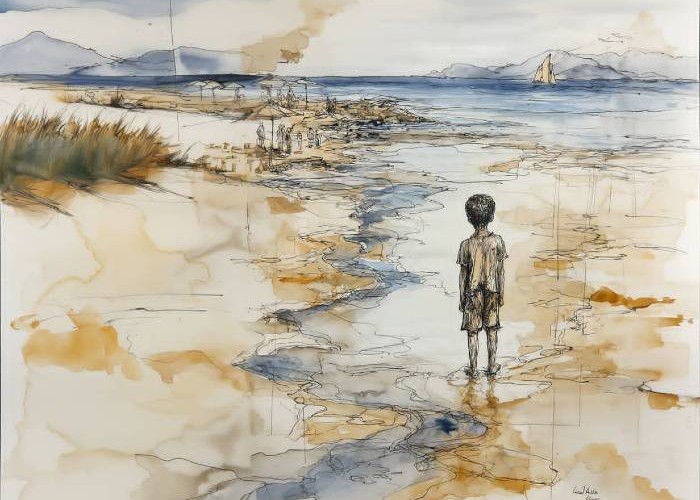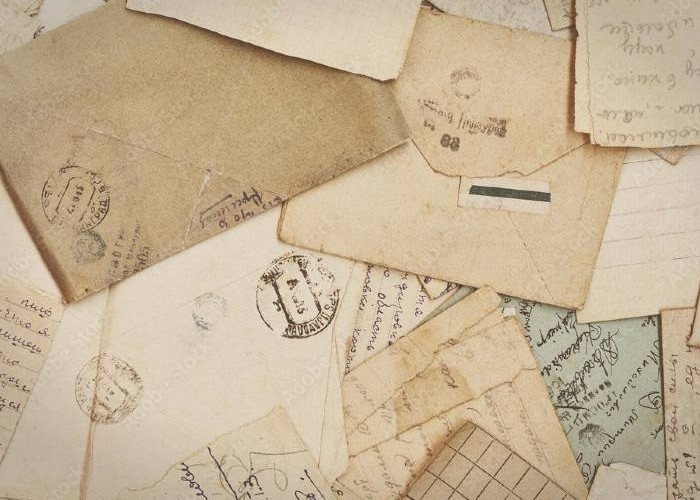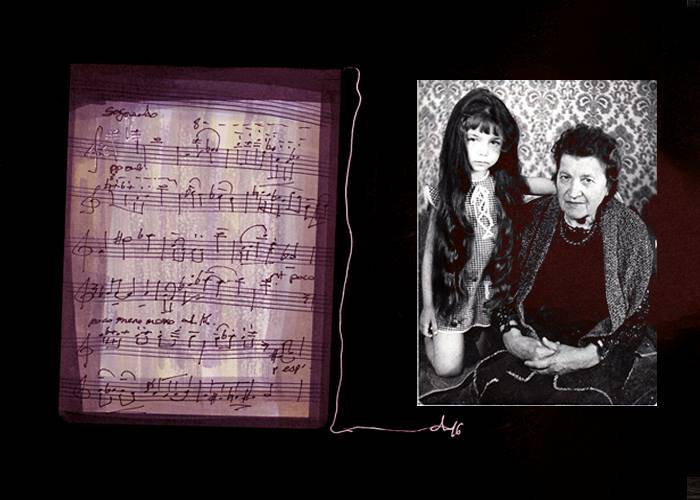1.
What do I remember?
Sounds, sound all around.
I don’t know words yet, but I can feel melodies of phrases.
Everything is music: the voices of people, the wind outside, the bell of the streetcar.
When people speak loudly, I want to cry – there are more sounds than I can hold!
I have no space left to breathe and gasp for air.
The voices become quieter, slower, lower…
I can breathe again.
(Volume)
2.
Mama is teaching her students.
I am crawling on the rug. I already know the names of the notes – Do-Re-Mi-Fa-Sol-La-Si. They are my friends. Each note is a different sound, each note is a different color.
Mama is explaining how sound flies.
If sound can fly – where are its wings?
Perhaps, they are invisible – the sound is flying and flapping its invisible wings.
How does the sound look without its wings?
Lying on my belly, I try to imagine the body of the sound. Without wings.
Instead of the body – I only see wings – wings of different colors. ‘Do’ is white with a rainbow overflowing on feathers, ‘Sol’ is golden, ‘La’ is red.
I understand now: the sound is the wings – long or clipped, colorful, wavy… The sound is the flight itself and the trail of after-flight; the wound left in the air, disappearing like ripples in water.
The sound is what continues to echo in the memory when nothing is sounding.
(What Is Sound?)
3.
My mother is carrying me in her arms, “Look at your stroller now. Look at it for the last time. You will never see it again.”
I see the doorway to the bedroom. There is my stroller – red, much taller than me.
But what is ‘never’?
What a strange word – so heavy – this moment is forever engraved in my memory: the red stroller and my mother’s words.
(What Is Never?)
4.
My parents do not buy a new stroller. Instead, they roll me around in a folding carriage, an accessory intended for a large doll. I do not like that doll. I’m afraid of her – her plastic complacency, her empty eyes. But the doll’s stroller is helpful – I quickly tire of walking.
When I was born, the doctors said I had problems with my legs and would not be able to walk. For a year, my frightened mother took me for therapy every day. I walked ahead of schedule.
More than walking, I love flying while listening to music, hundreds of winged creatures – sounds – holding me up, not letting me fall.
(Canceled Sentence)
5.
My grandmother, Alichka, walks poorly.
Her legs are bowed like two letters C’s. Pain hides in each step.
Alichka brings me to the Tsvilling Square.
(She rolls me in the stroller from the doll I do not like.)
On the bench, next to her, sits an old woman with a mourning veil.
She is mourning for her son. There was a war. Yurochka was only ten.
He was all swollen from dropsy and hunger.
He asked for a gun, “Just shoot me, mama.”
The doctor said Yurochka would not survive the night.
He did not survive.
Alichka: “Maybe you can help us tomorrow with Lera? Her parents are at work; she’s too weak for a nursery, but it’s so difficult with my legs.”
Marianna entered my life – the guardian of my childhood.
(Are You Still Watching Over Me?)
6.
I’m three and a half. I already can read words and notes.
I create fairytales and stories – l tell them to my old Rönisch upright piano.
Without music words lose their magic.
If I stand on one leg and press the piano pedal with the other foot – the wings of sounds become so long they can fly far away into the great unknown.
Yet I feel that all is distorted, not what it could be… But what could it be?
Where do the true sounds hide?
(Searching)
7.
Too bad that seated I can’t reach the piano pedals.
Mama does not allow me to play the piano while standing. She says it is bad for my professional education. Luckily, she’s not home during the day, and Marianna doesn’t mind.
While standing, I can press the pedal and paint an ocean of sounds.The ocean is calm. The ocean is enormous. The ocean is the bluest of blues in E-flat major. Arpeggios of waves slowly float under my fingers.
Now a lonely sail appears / amidst the blue mist of the sea…
Rebellious, it seeks out a storm.*
The melody of the sail is full of awe. The sail is thirsty for the storm.
– Ah, you want a storm? I’ll show you a storm!
In between the sea and clouds proudly soars the stormy petrel.
He cries out and the clouds hear his joy in the bird’s cry of courage.
Thunder sounds in foamy anger, the waves groan with wind in conflict.**
A thunderstorm rages in C minor – lots of pedal, clusters of thunder, glissandi of winds.
The ocean was swollen and sullen
Its billows were boiling with fury.***
One still hears the theme of the sail, but it is irreparably destroyed by its daring dream.
It is drowning – the theme of the sail sounds lower and lower, sinking to the bottom of the sea.
Now the storm has passed. The ocean is calm again, as before. Triadic waves splash softly as if nothing had happened. Only far in the clouds – a memory – one can hear the theme of the dreamy sail.
I sob with delight and horror at the drama that just erupted beneath my fingers.
(The Monstrous Power of Music)
8.
When Mama returns, I want to repeat for her the story of the brave, lonely sail.
But the theme of the sail is different now, and waves are not the same…
I cannot repeat my story. As in a crooked mirror – what was beautiful before has turned into its ugly caricature.
I’m crying, no longer with delight, but with shame: everything’s false again.
Where did the true sounds disappear?
(Where?)
9.
Mama says, “If you wish to save ‘true’ sounds, you need to write them down as soon as they are born.” She hands me a Notebook for Music.
“How do I write them down? With words?”
“Why words? You already know how to write notes. When you have ideas for words, you should use letters, but when you hear music – you should use notes. With the help of notes, you can always find your way back and remember what you played. Music notation is a time machine to travel to the past and to the future. Written music remains forever.”
“Mama, what is ‘forever?’”
(What Remains?)
10.
Every morning I remember that I have to go to kindergarten and begin to cry.
Papa comes to my crib. He is holding a small empty jar. I keep on wailing.
“Here, take this – it’s a piggy-bank for tears. Tears are precious and they should be protected. If you are so intent on crying, then cry into this jar and save your tears.”
I obediently cry into the jar, accumulate tears. Each drop – like a caught note written in my Notebook for Music. Perhaps music notes are unshed tears?
Where are you, my piggy-bank of tears?
(Unshed Tears)
~~~
*Mikhail Lermontov
** Maxim Gorkyi
*** Alexander Pushkin














































